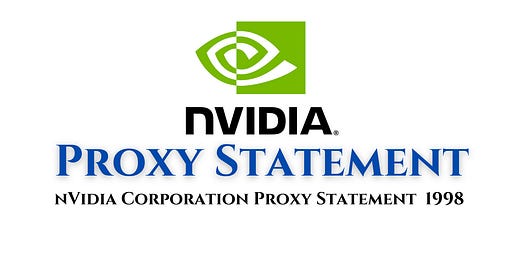Here is a detailed briefing document reviewing the main themes and most important ideas or facts from the provided NVIDIA CORP FORM DEF 14A filing from May 17, 1999:
BRIEFING DOCUMENT: NVIDIA CORP FORM DEF 14A (PROXY STATEMENT)
Source: nVidia Proxy Statement for Stockholders Annual Report 1998
SUMMARY:
This document is a definitive proxy statement filed by NVIDIA Corporation in advance of its 1999 Annual Meeting of Stockholders, scheduled for June 17, 1999. The purpose of the meeting is to vote on key corporate matters, including the election of directors, the amendment of the employee stock purchase plan, and the ratification of the independent accountants. The document also provides detailed information about the company's directors, executive officers, compensation plans, and stock ownership.
KEY THEMES AND IMPORTANT IDEAS/FACTS:
Annual Meeting Agenda: The 1999 Annual Meeting of Stockholders will address four main items:
Election of two directors to serve until the 2002 Annual Meeting.
Approval of an amendment to the 1998 Employee Stock Purchase Plan to allow for annual increases in the number of shares reserved.
Ratification of KPMG LLP as the independent accountants for the fiscal year ending January 30, 2000.
Transaction of any other business that may properly come before the meeting.
Importance of Stockholder Vote: The company emphasizes the importance of each stockholder's vote and strongly encourages stockholders to submit their proxy card even if they plan to attend the meeting in person. This ensures representation at the meeting.
Voting Rights and Record Date: Only holders of record of Common Stock as of the close of business on April 30, 1999, are entitled to vote. Each share of Common Stock held on this date is entitled to one vote on all matters. There were 29,308,984 shares outstanding and entitled to vote on April 30, 1999.
Election of Directors (Proposal 1):
The Board of Directors is divided into three classes with staggered three-year terms.
Two directors are up for election in this class, with terms expiring at the 2002 Annual Meeting.
The nominees for election are Harvey C. Jones, Jr. and William J. Miller, both of whom are current directors.
Information about the nominees' professional backgrounds and other directorships is provided.
Other directors continuing in office until the 2000 Annual Meeting are Tench Coxe, Mark A. Stevens, James C. Gaither, Jen-Hsun Huang (President, CEO, and co-founder), and A. Brooke Seawell.
Amendment to the 1998 Employee Stock Purchase Plan (Proposal 2):
The most significant proposal is to amend the Employee Stock Purchase Plan (Purchase Plan) to automatically increase the number of shares reserved for issuance annually for 10 years.
The current reserve is 500,000 shares.
The proposed amendment would increase the reserve at the end of each fiscal year (last Sunday in January), starting at the end of fiscal 2000, by an amount equal to 2% of the outstanding shares on that date (including on an as-if-converted basis Preferred Stock and convertible notes, and outstanding options and warrants, calculated using the treasury stock method).
The maximum aggregate increase over the 10-year period would be 6 million shares, bringing the potential total reserve to 6.5 million shares by January 2009.
The rationale for this amendment is to attract and retain personnel in a competitive environment and to minimize the possibility of incurring a charge to earnings if a shortfall were to occur in available shares due to increased employee participation.
The Purchase Plan allows eligible employees to buy Common Stock at a discount (85% of the lesser of the fair market value on the first day of the offering or the last day of the purchase period) through payroll deductions (currently limited to 10% of compensation).
As of April 30, 1999, approximately 245 out of 248 employees were eligible, but no shares had been purchased yet. The first purchase date was scheduled for August 31, 1999.
Ratification of Independent Auditors (Proposal 3):
The Board has selected KPMG LLP as the independent auditors for the fiscal year ending January 30, 2000.
Stockholder ratification is sought as a matter of good corporate practice, although it is not legally required by the company's bylaws.
Even if ratified, the Audit Committee and Board can still appoint different independent auditors if deemed in the best interests of the company.
Board Committees:
The Board has an Audit Committee (Messrs. Seawell and Stevens) and a Compensation Committee (Messrs. Coxe and Jones).
The Audit Committee reviews the annual audit and financial statements and recommends independent accountants.
The Compensation Committee makes recommendations on salaries and incentive compensation, awards stock options, and determines compensation levels.
Stock Ownership Information:
A table details the beneficial ownership of Common Stock as of April 30, 1999, for directors, nominees, executive officers, and beneficial owners of more than 5%.
Key significant beneficial owners include entities associated with Sequoia Capital VI (10.6%) and Sutter Hill Ventures (7.3%).
Executive officers with notable ownership include Jen-Hsun Huang (9.9%), Chris A. Malachowsky (10.3%), and Curtis R. Priem (10.5%).
Executive Compensation:
Directors do not receive cash compensation but receive stock options under the 1998 Non-Employee Directors' Stock Option Plan.
Non-employee directors automatically receive initial grants (50,000 shares) upon election and annual grants (20,000 shares) and committee grants (5,000 shares per committee) after each Annual Meeting.
The Compensation Committee's philosophy is to maintain base salaries at the industry median for comparable companies and provide significant equity-based compensation to align executive interests with stockholders.
The Company's executive compensation has two components: Base Salary (targeted at the median of comparable companies) and Equity Incentives (primarily stock options).
Stock options are granted under the 1998 Equity Incentive Plan, typically vest over four years (25% after one year, then quarterly), and have a 10-year term.
Certain executive officers (Messrs. Huang, Malachowsky, and Priem) are not eligible for the Employee Stock Purchase Plan due to applicable laws regarding stock ownership.
The Summary Compensation Table shows compensation for the Named Executive Officers for fiscal years ended January 31, 1999, and December 31, 1997. Jen-Hsun Huang's base salary increased from $149,134 in 1997 to $250,000 in 1999, and he received an option grant for 400,000 shares in 1999.
Compensation Committee Report:
The Compensation Committee sets executive compensation policies and practices.
Their goal is to enhance stockholder value by aligning executive financial interests with those of stockholders.
Base salaries are targeted at the industry median for comparable companies.
Long-term equity incentives (stock options) are the primary means to retain and motivate employees and link their interests to stock performance.
The Committee reviewed Jen-Hsun Huang's compensation, increasing his base salary to be in line with industry averages and granting him a significant stock option to strengthen the alignment of his interests with stockholders during a critical phase of the company's development.
Performance Graph:
The document includes a graph comparing the cumulative total return of an investment in NVIDIA Common Stock, the Hambrecht & Quist Technology Index, and the Nasdaq Stock Market (U.S.) from January 22, 1999, to March 31, 1999.
This graph shows the initial performance of the stock after its initial public offering.
Other Employee Benefit Plans:
1998 Equity Incentive Plan: Authorizes the issuance of stock options, restricted stock purchase awards, and stock bonuses. As of April 30, 1999, options for over 8.9 million shares were outstanding, with over 2.5 million shares remaining available for grant. The available shares automatically increase annually by 5% of outstanding Common Stock.
NVIDIA Corporation 401(k) Retirement Plan: Allows eligible employees to contribute up to 20% of their compensation, up to a statutory limit. The company may make discretionary contributions but has not done so to date.
Indemnity Agreements: The company has entered into indemnity agreements with each director and executive officer, agreeing to indemnify them for expenses incurred in actions or proceedings due to their status, to the fullest extent permitted by law.
QUOTES:
"At the meeting, stockholders will be asked to (a) elect two directors to hold office until the 2002 Annual Meeting of Stockholders; (b) approve the amendment of the Company's 1998 Employee Stock Purchase Plan; (c) ratify the selection of KPMG LLP as independent accountants of the Company for its fiscal year ending January 30, 2000; and (d) transact such other business as may properly come before the meeting or any adjournment or postponement thereof."
"Because the vote of each stockholder is important, we ask that you sign and return the enclosed proxy card in the envelope provided, whether or not you now plan to attend the meeting."
"To elect two directors to hold office until the 2002 Annual Meeting of Stockholders;"
"To approve an amendment of the Company's 1998 Employee Stock Purchase Plan to provide for annual increases to the number of shares reserved for issuance thereunder at the end of each fiscal year, commencing at the end of fiscal 2000;"
"To ratify the selection of KPMG LLP as independet accountants of the Company for its fiscal year ending January 30, 2000;"
"Management believes that stock ownership is one of the prime methods of attracting a d retaining the key personnel responsible for the continued development and growth of the Company's business."
"In addition, an employee stock purchase plan is considered a competitive necessity in the high- technology industry."
"In order to be able to attract and retain personnel in a competitive environment and at the same time minimize the possibility of incurring a charge to earnings if a shortfall were to occur, stockholders are requested in this Proposal 2 to approve the amendment to the Purchase Pl n."
"As amended, the number of shares reserved for issuance nder the Purchase Plan would be increased automatically each year... by an amount equal to 2% of the outstanding shares of the Company on each date..."
"The Company's philosophy regarding base salaries for executives is conservative, with the goal of maintaining base salaries at the industry median for comparable companies."
"The Committee also provides significant equity-based compensation pursuant to its 1998 Equity Incentive Plan and 1998 Employee Stock Purchase Plan (collectively, the 'Plans')."
"The Committee believes this element of the total compensation program directly links the participant's interests with those of the stockholders and the long-term value of the Company."
"In fiscal 1999, the Compensation Committee adjusted the base salary component of executive compensation to bring it in line with industry medians."
This briefing document summarizes the critical points and proposals outlined in the NVIDIA CORP FORM DEF 14A filing from May 17, 1999, providing a concise overview of the matters to be voted upon at the upcoming Annual Meeting and the company's related compensation and governance structures.














Share this post